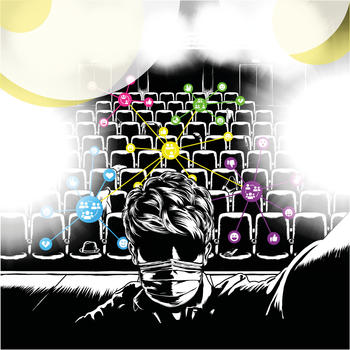Event Series | Temporal Communities and Digitality – Theatre During the Pandemic, No. 4 Japan
A series of events organised by Doris Kolesch and Kai Padberg, Research Area 2: "Travelling Matters".
Please register with Judith König (j.koenig2@fu-berlin.de) by 14 February 2021.
This event will be streamed live.
Click here for the livestreamNote: In order to log in to the livestream, non-members of Freie Universität Berlin will have to provide their name and e-mail address. The data will not be saved.
The fourth event of our series is an online talk with:
Kaku Nagashima, dramaturge and artistic director of the Tokyo Festival, Japan, was born in Tokyo in 1969. He studied French literature at Rikkyo University in Tokyo. During his graduate studies, Nagashima started researching and translating the later prose of Samuel Beckett. His involvement with theatre began as a performance surtitles operator and script translator. He became a pioneer of dramaturgy in Japan and has worked in that capacity with a wide range of directors and choreographers. Seeking ways to take theatre concepts and know-how outside the regular theatre spaces, he has recently become more involved in various art projects. Nagashima focuses on script development from conceptualisation to editing and structuring, as well as working with voice and body. His works include “Atomic Cyber” (directed by Hatsumi Abe), “4.48 Psychosis” (directed by Norimizu Ameya), “Hedda Gabler” (directed by Keiko Miyata) and many more. He has recently also participated in projects outside of theatre buildings, such as the site-specific House of Atreus project. He has been the director of “Festival/Tokyo”, Japan´s leading performing arts event since 2018.
Chisato Sone was born in Hyogo in 1991. She is part of the directing department of the Seinendan theatre company, founded by one of Japan’s foremost directors, Oriza Hirata, with whom Sone trained. After graduating from Osaka University, she worked in research and development for an IT recruiting corporation while studying at Komaba Agora’s Murinkan theatre school. Today she works as a director, theatre venue producer and dramaturge. Her directing credits include “The Right to Play” (2019), “Recitations” (2019), “The Empty Park”(2020) and “The City & The City: Divided Senses” (2020). She was involved in international co-productions at the “Festival Tokyo(F/T)” in 2019 and 2020, and was an assistant dramaturge on “Always Coming Home” (2019, with TR Warsaw). She is a recipient of a 2019 creative environment innovation programme grant from “The Saison Foundation”. Recently, Sone organised the research project “Audio Theater 1.0” with composers and sound crews as part of her effort to create a new form of theatre beyond the stage and using only audio elements.
Moderator:
Prof. Dr. Doris Kolesch (Institute for Theatre Studies, FU Berlin, Germany)
It was the middle of March 2020 when Germany went into lockdown. Back then, there had already been a curfew in Wuhan, China, for several weeks. In many other countries in Europe and worldwide, public life was abruptly shut down. The consequences for the cultural sector have been dire everywhere. All over the world, theatres have had to shut down unexpectedly and most remain closed. Schedules have been cancelled. Professional existences are endangered. At the same time, public and cultural life has shifted to the digital sphere. Many theatres and artists are using this way to stay in touch with their audiences and are exploring digital spaces more than ever before. But what forms of community-building are even remotely possible for theatre and the performing arts? What is the character of the relation between local institutions and these transnational spaces, which might open up and expand while national borders remain closed? What does it mean for artistic practice if humans assemble as a virtual audience while being physically alone in their respective homes? In what ways will the pandemic change theatre? What will digital assemblies mean for theatres after the pandemic?
In the series of events entitled "Temporal Communities and Digitality – Theatre During the Pandemic", theatre directors, theatre artists and scholars from around the world will report on the practical effects on theatre operations and their work. They will examine the various strategies with which stage and theatre creators have reacted to this situation, online and offline. Together with researchers from the Cluster of Excellence "Temporal Communities: Doing Literature in a Global Perspective", they will discuss how the global crisis of the theatre has created new temporal communities and to what extent these are created under the conditions of digitality.
This event is part of our series "Temporal Communities and Digitality - Theatre During the Pandemic".
